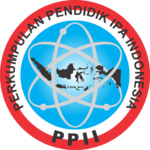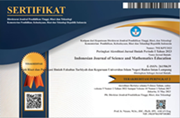Empowering minds: How guided inquiry enhances scientific reasoning in students with varied self-efficacy levels
Abstract
Keywords
Full Text:
PDFReferences
A. E. Lawson, “The nature and development of scientific reasoning: A synthetic view,” Int. J. Sci. Math. Educ., vol. 2, no. 3, pp. 307–338, 2004, doi: 10.1007/s10763-004-3224-2.
E. Yulianti and N. N. Zhafirah, “Peningkatan kemampuan penalaran ilmiah siswa sekolah menengah pertama melalui model pembelajaran inkuiri terbimbing,” Jurnal Penelitian Pendidikan IPA., vol. 6, no. 1, pp. 125-130, 2020, doi: 10.29303/jppipa.v6i1.341.
M. Tohir, “Hasil PISA Indonesia tahun 2018 turun dibanding tahun 2015,” Pap. Mat., vol. 2, no. 1, pp. 1–2, 2019.
I. Wilujeng and H. A. C. Wibowo, “Penalaran ilmiah mahasiswa calon guru fisika dalam pembelajaran daring,” Edu Cendikia J. Ilm. Kependidikan, vol. 1, no. 2, pp. 46–54, 2021, doi: 10.47709/educendikia.v1i2.1025.
W. F. McComas, Trends in International mathematics and science study (TIMSS), Boston : Language Science Eduction, 2014.
M. D. W. Ernawati, A. Sanova, D. A. Kurniawan, and Y. D. Citra, “The junior high school students’ attitudes and self-efficacy towards science subjects,” J. Inov. Pendidik. IPA, vol. 8, no. 1, pp. 23–36, 2022, doi: 10.21831/jipi.v8i1.42000.
F. Anjani, S. Supeno, and S. Subiki, “Kemampuan penalaran ilmiah siswa SMA dalam pembelajaran fisika menggunakan model inkuiri terbimbing disertai diagram berpikir multidimensi,” Lantanida J., vol. 8, no. 1, pp. 14-36, 2020, doi: 10.22373/lj.v8i1.6306.
O. N. Sigiro, D. V. Sigit, and R. Komala, “Hubungan efikasi diri dan penalaran ilmiah dengan hasil belajar biologi siswa SMA,” Biosf. J. Pendidik. Biol., vol. 10, no. 2, pp. 30–34, 2017, doi: 10.21009/biosferjpb.10-2.4.
I. Agus, “Hubungan antara efikasi diri dan kemampuan berpikir kritis matematika siswa,” Delta J. Ilm. Pendidik. Mat., vol. 9, no. 1, pp. 1-8, 2021, doi: 10.31941/delta.v9i1.1061.
I. D. A. M. Budhyani, M. Candiasa, M. Sutajaya, and P. K. Nitiasih, “The effectiveness of blended learning with combined synchronized and unsynchronized settings on self-efficacy and learning achievement,” Int. J. Eval. Res. Educ., vol. 11, no. 1, pp. 321–332, 2022, doi: 10.11591/ijere.v11i1.22178.
W. W. F. Lau, “Predicting pre-service mathematics teachers’ teaching and learning conceptions: The role of mathematical beliefs, mathematics self-efficacy, and mathematics teaching efficacy,” Int. J. Sci. Math. Educ., vol. 20, no. 6, pp. 1141–1160, 2022, doi: 10.1007/s10763-021-10204-y.
T. Ecevit and S. Kıngır, “Primary student teachers’ teaching-learning conceptions, attitudes and self-efficacy beliefs toward science teaching,” J. Turkish Sci. Educ., vol. 19, no. 3, pp. 773–785, 2022, doi: 10.36681/tused.2022.149.
M. A. Samsudin, S. M. Jamali, A. N. M. Zain, and N. A. Ebrahim, “The effect of STEM project based learning on self-efficacy among high-school physics students,” J. Turkish Sci. Educ., vol. 17, no. 1, pp. 94–108, 2020, doi: 10.36681/tused.2020.15.
P. L. P. M. Nugroho Adi Saputro, “Mengukur keefektifan teori konstruktivisme dalam pembelajaran,” Front. Neurosci., vol. 14, no. 1, pp. 1–13, 2021, doi : 10.31539/joeai.v4i1.2151
S. Hidayatullah and R. Wulan, “Meta-analysis of the influence of 21st century high school students’ skills in learning physics using a guided inquiry model,” J. Phys. Conf. Ser., , 2022, pp. 1-7, doi: 10.1088/1742-6596/2309/1/012057.
J. van der Graaf, E. van de Sande, M. Gijsel, and E. Segers, “A combined approach to strengthen children’s scientific thinking: direct instruction on scientific reasoning and training of teacher’s verbal support,” Int. J. Sci. Educ., vol. 41, no. 9, pp. 1119–1138, 2019, doi: 10.1080/09500693.2019.1594442.
M. Ardiany, W. Wahyu, and A. Supriatna, “Enhancement of self efficacy of vocational school students in buffer solution topics through guided inquiry learning,” J. Phys. Conf. Ser., 2017, pp. 1-10, doi: 10.1088/1742-6596/895/1/012118.
S. H. Noer, P. Gunowibowo, and M. Triana, “Improving students’ reflective thinking skills and self-efficacy through scientific learning,” J. Phys. Conf. Ser., 2020, pp. 1-9, doi: 10.1088/1742-6596/1581/1/012036.
D. Hilfert-Rüppell, M. Meier, D. Horn, and K. Höner, “Professional knowledge and self-efficacy expectations of pre-service teachers regarding scientific reasoning and diagnostics,” Educ. Sci., vol. 11, no. 10, 2021, doi: 10.3390/educsci11100629.
E. Lovisia, “Pengaruh model pembelajaran inkuiri terbimbing terhadap hasil belajar,” Sci. Phys. Educ. J. (SPEJ), vol. 2, no. 1, pp. 1–10, 2018.
N. M. P. D. Apriliani, I. M. C. Wibawa, and N. W. Rati, “Pengaruh model pembelajaran inkuiri terbimbing terhadap hasil belajar IPA,” J. Penelit. Dan Pengemb. Pendidik., vol. 3, no. 2, pp. 122–129, 2019.
L. S. Amijaya, A. Ramdani, and I. W. Merta, “Pengaruh model pembelajaran inkuiri terbimbing terhadap hasil belajar dan kemampuan berpikir kritis peserta didik,” J. Pijar Mipa, vol. 13, no. 2, pp. 94–99, 2018.
N. K. D. Muliani and I. M. C. Wibawa, “Pengaruh model pembelajaran inkuiri terbimbing berbantuan video terhadap hasil belajar IPA,” J. Ilm. Sekol. Dasar, vol. 3, no. 1, pp. 107–114, 2019.
K. W. A. Siahaan, S. T. P. Lumbangaol, J. Marbun, A. D. Nainggolan, J. M. Ritonga, and D. P. Barus, “Pengaruh model pembelajaran inkuiri terbimbing dengan multi representasi terhadap keterampilan proses sains dan penguasaan konsep IPA,” J. Basicedu, vol. 5, no. 1, pp. 195–205, 2021.
M. L. Ilhamdi, D. Novita, and A. N. K. Rosyidah, “Pengaruh model pembelajaran inkuiri terbimbing terhadap kemampuan berpikir kritis IPA SD,” J. Ilm. Kontekst., vol. 1, no. 02, pp. 49–57, 2020.
F. Sarifah and T. Nurita, “Implementasi model pembelajaran inkuiri terbimbing untuk meningkatkan keterampilan berpikir kritis dan kolaborasi siswa,” PENSA E-Jurnal Pendidik. Sains, vol. 11, no. 1, pp. 22–31, 2023.
Yuberti and Antomi Saregar, Pengantar metodologi penelitian pendidikan matematika dan sains. Bandar Lampung: AURA CV. Anugrah Utama Raharja, 2020.
J. Rogers and A. Révész, Experimental and quasi-experimental designs. New york : The Routledge, 2016.
I. and Amelia, Model-model pembelajaran matematika, 1st ed. Jakarta: PT Bumi Aksara, 2018.
C. Piraksa, N. Srisawasdi, and R. Koul, “Effect of Gender on Student’s Scientific Reasoning Ability: A Case Study in Thailand,” Procedia - Soc. Behav. Sci., vol. 116, pp. 486–491, 2014, doi: 10.1016/j.sbspro.2014.01.245.
Albert Bandura, “Self-Efficacy: Toward a unifying theory of behavioral change,” Am. Polit. Sci. Rev., vol. 1, no. 4, pp. 139–161, 1978, doi: 10.1017/S0003055400259303.
D. A. Putri and A. Warmi, “Analisis self efficacy terhadap pembelajaran matematika siswa kelas viii smp teratai putih global analysis of self efficacy towards learning mathematics,” Prosiding Seminar Nasional Matematika dan Pendidikan Matematika (Sesiodika), 2022, pp. 203–214, doi : 10.35706/sesiomadika.v4i1
R. Sundayana, Statistika Penelitian Pendidikan, 2nd ed. Bandung: Alfabeta, 2020.
D. S. Utami, L. K. Muharrami, W. P. Hadi, and M. Ahied, “Profil scientific reasoning ability siswa pada materi gerak benda,” Quantum J. Inov. Pendidik. Sains, vol. 11, no. 2, p. 93, 2020, doi: 10.20527/quantum.v11i2.8570.
S. Sulistiawati, D. Suryadi, and S. Fatimah, “Desain didaktis penalaran matematis untuk mengatasi kesulitan belajar siswa SMP pada luas dan volume limas,” Kreano, J. Mat. Kreat., vol. 6, no. 2, p. 135, 2015, doi: 10.15294/kreano.v6i2.4833.
P. R. Pintrich and E. V. De Groot, “Motivational and self-regulated learning components of classroom,” J. Educ. Psychol., vol. 82, no. 1, pp. 33–40, 1990.
N. I. Kurbanoglu and A. Akin, “The relationships between university students’ chemistry laboratory anxiety, attitudes, and self-efficacy beliefs,” Aust. J. Teach. Educ., vol. 35, no. 8, pp. 48–59, 2010, doi: 10.14221/ajte.2010v35n8.4.
Darta, J. Saputra, W. Eliyarti, B. Y. G. Putra, and T. Kandaga, “Improvement of the ability of representation, reasoning, and self-efficacy of prospective mathematics teacher students by using learning with a scientific approach,” J. Phys. Conf. Ser., vol. 1776, no. 1, 2021, doi: 10.1088/1742-6596/1776/1/012002.
S. N. Indahsari, Supeno, and Maryani, “Student worksheet based on inquiry with vee map to improve students’ scientific reasoning ability in physics learning in senior high school,” J. Phys. Conf. Ser., 2020, pp. 1-10, doi: 10.1088/1742-6596/1465/1/012036.
DOI: http://dx.doi.org/10.24042/ijsme.v7i1.22625
Refbacks
- There are currently no refbacks.
Copyright (c) 2024 Unit Riset dan Publikasi Ilmiah FTK UIN Raden Intan Lampung

This work is licensed under a Creative Commons Attribution-ShareAlike 4.0 International License.

Indonesian Journal of Science and Mathematics Education is licensed under a Creative Commons Attribution-ShareAlike 4.0 International License.




